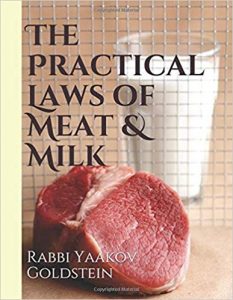
*As an Amazon Associate I earn from qualifying purchases.
Non-Kosher meat:
Non-Kosher species of animals:[1] The meat of a non-Kosher species of animals [i.e. horse, ham] does not contain a Biblical Basar Bechalav prohibition. Thus, from the letter of the law, it may be cooked with milk and benefited from. However, due to Maras Ayin, it is forbidden to cook it with milk.[2]
Kosher domestic animal which is a Treifa or Neveila: The meat of a Kosher species of a domestic animal which is not Kosher due to Neveila or Treifa, retains a Biblical Basar Bechalav prohibition and it is thus Biblically forbidden to be cooked together with milk and one who does so receives lashes.[3] However, the Poskim[4] rule that although it is Biblically forbidden to cook the meat with milk, if one eats this Basar Bechalav mixture he does not transgress the prohibition of eating Basar Bechalav, but rather only the prohibition against eating a Neveila or Treifa. Accordingly, some Poskim[5] rule that there is likewise no prohibition to benefit from this mixture.[6] Other Poskim[7], however, rule that it is Biblically
________________________________ [1] Michaber 87:3; Mishneh Chulin 113a [See Q&A regarding the Issur Basar Bechalav by non-Kosher animals]
[2] Rama 87:4; Shach 87:7 in his first [and later negated] explanation; Taz 87:5 in his conclusion
Other Opinions: Some Poskim suggest that perhaps only when both foods are Kosher do we apply the Issur of cooking due to Maaras Ayin. [Taz 87:5; The Beir Heiytiv 87:7 explains that according to the Rama there is no Maaras Ayin prohibition to cook non-Kosher meat with non-Kosher milk since both components are non-Biblical, and the Maaras Ayin only applies if one of the ingredients are Biblical.]
[3] Implication of Michaber 87:3 [who states “non-kosher animal” instead of “non-kosher meat”]; Rama 87:6 [who rules that one may not elevate fire under gentile’s pot because perhaps there is milk and meat inside, thus implying that the prohibition applies even if the meat is not-kosher, but from a Kosher species.]; Rambam Machalos Assuros 9:6; Bach 92; Kneses Hagedola 92:14; Beis Hillel 87:2; Kanfei Yonah 87; Erech Hashulchan 94:10; P”M 87 S.D. 16 and 92 S.D. 10; Shaar Efraim 38; Machazik Bracha 87:15-17; Zechor Leavraham Y.D. 92:2; Degul Merivava 87:3; Chasam Sofer 92; Pischeiy Teshuvah 87:4 and 6; Gilyon Maharsha 87:3; Zivcheiy Tzedek 87:13 and 41; Aruch Hashulchan 87:12; Kaf Hachaim 87:19-20 and 56, and 92:17; See Matei Yehonasan 87:3; Yad Avraham 87:3
[4] Rambam Machalos Assuros 9:6; Degul Merivava 87:3; Chasam Sofer ibid; Yad Avraham 87:3; See Pischeiy Teshuvah 87:6; Two opinions in Chulin 113
The reason: As the non-Kosher meat or milk is already individually Biblically forbidden in consumption and the rule is that we do not add one Issur to another in such a situation. [Rambam ibid]
[5] Rambam in Pirush Hamishnayos Kerisus 3 [see Rambam La’am Machalos Assuros 9:6 footnote 29]; Degul Merivava 87:3 allows to be lenient like Rambam in a case of loss; Chasam Sofer ibid concludes that one who is lenient like the Noda Beyehuda has upon whom to rely; See Pischeiy Teshuvah 87:6; Yad Avraham 87:3
[6] The reason: As the prohibition against benefit is an offshoot of the eating prohibition, and since there is no Basar Bechalav prohibition in eating the mixture, it is therefore permitted in benefit.
[7] Beis Hillel 87:2; Kanfei Yonah 87; P”M 87 S.D. 16; Shaar Efraim 38; Machazik Bracha 87:15-17; Gilyon Maharsha ibid; Zivcheiy Tzedek 87:13 and 41; Aruch Hashulchan 87:12; Kaf Hachaim 87:19 and 56; Chasam Sofer ibid rules like the stringent opinion although concludes that one who is lenient like the Noda Beyehuda has upon whom to rely; See Rambam La’am ibid that it is implied from the Rambam ibid that he retracted from his ruling in Pirush Hamishnayos and rules that it is forbidden in benefit



Leave A Comment?
You must be logged in to post a comment.